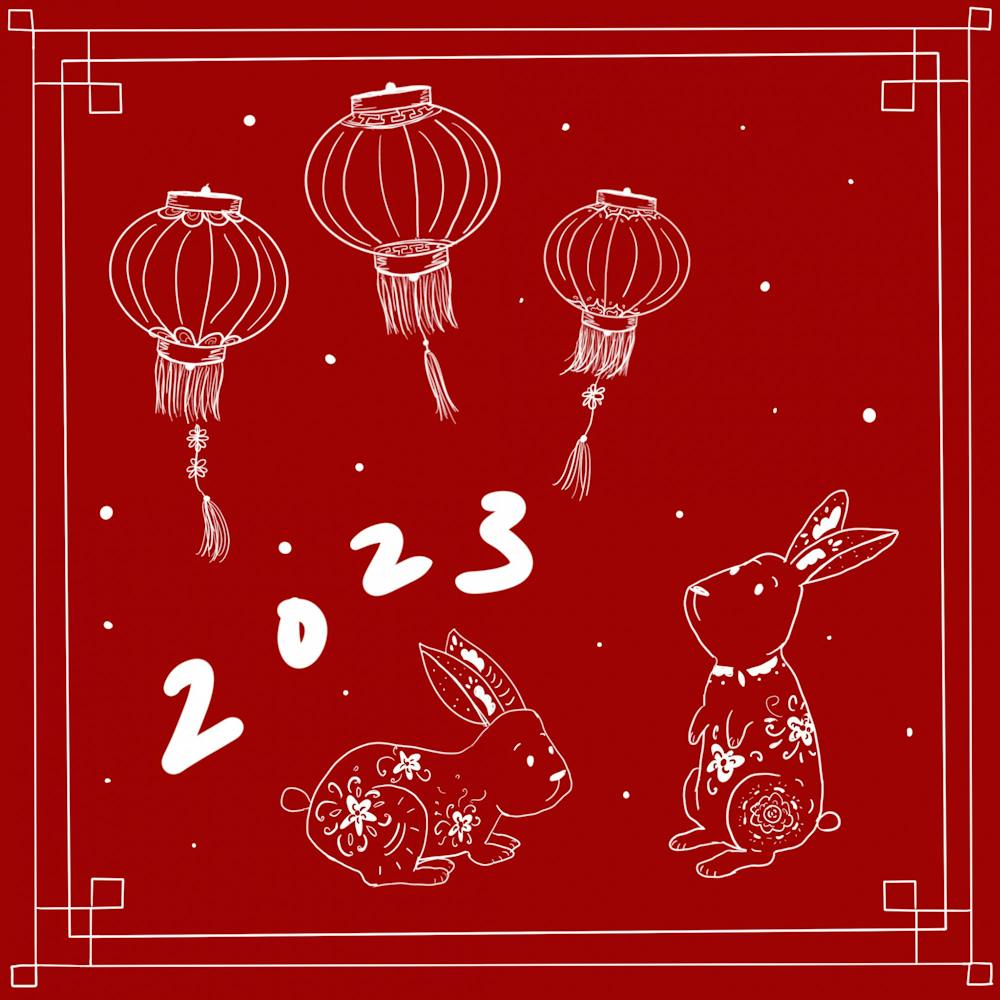As the spring semester begins, students and student groups across campus are celebrating the 2023 Lunar New Year, which marks the first new moon of 2023. Celebrations began Jan. 21 in the U.S. and Jan. 22 in Asia; in China, the holiday will end Feb. 6.
Lunar New Year traditions trace back thousands of years and are celebrated in Chinese, South Korean, Malaysian, Filipino, Singaporean, Indonesian and Vietnamese cultures, among others.
Each year is denoted by an animal zodiac sign that represents different attributes. For most celebrators, this year’s holiday kicks off the Year of the Rabbit; in Vietnam, this Lunar New Year marks the start of the Year of the Cat.
Students such as Jessica Ji ’24, president of the Chinese Students and Scholars Association, a group for Chinese students abroad, are celebrating both on and off campus.
“This year’s Lunar New Year is quite early and it’s seldom possible for us to spend it with our family,” Ji said. “But because this year’s Lunar New Year is during the winter holiday, many of our students” were home to celebrate, she said.
This year, the CSSA held its first in-person celebrations since the start of the COVID-19 pandemic, The Herald previously reported. The organization co-hosted a Spring Festival Gala Sunday in the Salomon DECI, Ji said. In past years, the event has been held online.
“We’re so glad to celebrate it in person,” Ji added. “It’s possible for us to make close contact and make our audience know each other.”
Other campus groups are also commemorating the Lunar New Year, such as the Brown-RISD Vietnamese Students Association. Brown-RISD VSA plans to hold festivities on Feb. 4, said First-Year Representative Brian Huynh ’26. The Brown Chinese Students Association will hold its Lunar Banquet on Feb. 10, according to a recent Instagram post.
Home and away for the holidays
As pandemic restrictions ease in China, travel for this Lunar New Year is more feasible, according to Professor of East Asian Studies Lingzhen Wang. But many students are celebrating the holiday on campus, which can prove challenging given that the federal government does not recognize the holiday, which would make it a day off.
“If the New Year's day is not a weekend, we are limited,” Wang said. At the University, faculty like to host celebrations for students studying Chinese but struggle to find mutual free time on the calendar for the events, she added.
“Chinese New Year is about family reunions, for the most part,” said Selina Liu ’24.
“So losing that part can be quite different, and sometimes makes (the experience) … more liminal, in the sense that we’re not actually at home.”
“There’s definitely a difference with the feeling of home,” said Chelyn Park ’24, vice president of Brown’s Korean American Students Association. “Spending it at home is a more real experience.”
Experiencing the holiday away from the “traditional, more festival” environment in China makes Chinese students at Brown “more aware of (their) own traditions and roots,” Liu noted.
“Back in China, this is the time that I would visit all my relatives, but now in the U.S., it’s the time for me to celebrate (the holiday) with my own Chinese community and friends,” said Ji. “So it’s really important because we’ve got a sense of belonging here, and we’re still adhering to our tradition.”
Similarly, Huynh said that for the VSA, Lunar New Year celebrations raise “everyone’s awareness of diversity and the different types of people we have at Brown.”
“It’s a great chance for people that are interested in the culture to get involved,” he said, “as well as people who might not know about their own culture.”
Historical roots and building culture
Lunar New Year has a long history of commemoration, with traditions that have transformed over “thousands of years of history,” Wang said.
Since the tradition of Lunar New Year is “all in legend,” details are hazy — but the lunar calendar correlates strongly with agricultural activities, and its practices emerged when China was more “agrarian,” she noted.
In Chinese legend, a mythical beast called Nian terrorized both people and animals on Lunar New Year’s eve. To ward off Nian and evil spirits, people would set off fireworks and hang New Year couplets, Wang said. Celebrations still incorporate firecrackers but primarily for “fun or festival” purposes rather than protection, she said.
“This New Year celebration is a way to reconnect with your own ancestors and local gods,” Wang said. “But the purpose, of course, is to request their blessings for the New Year, in terms of harvest, in terms of peace and health.”
The holiday has also become a central event for family reunions in China, Wang said, comparing it to Thanksgiving. But overseas, the event serves as an opportunity to bring together a “particular Chinese collective.”





